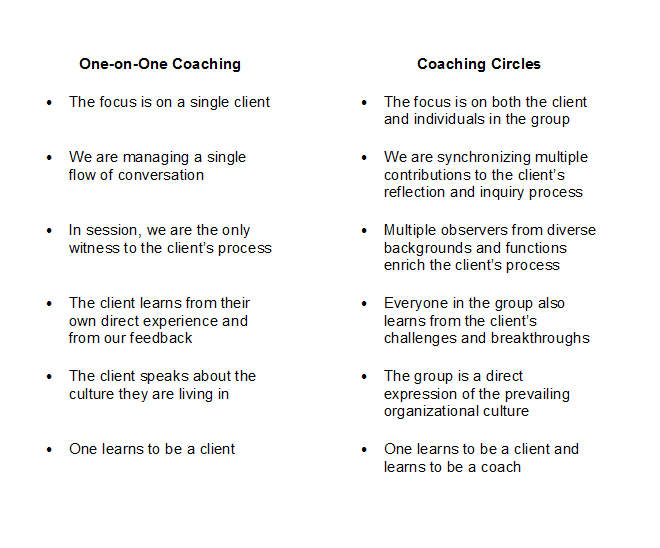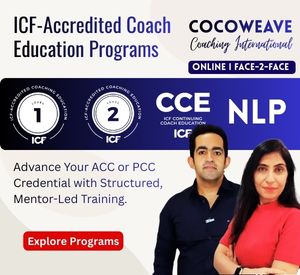In coaching, we have the wonderful opportunity and privilege to know another human being intimately and to support their unique quest for authentic self-expression in the world. We can easily understand how this is possible in a one-on-one coaching relationship, but it’s harder to imagine in a group setting, especially when the coaching comes mainly from colleagues and not the professional coach! Yet, this is exactly what happens in coaching circles.
A Powerful Way of Working with a Group
In contrast with team or group coaching, where the focus is on coaching a group toward a common goal, in coaching circles a facilitator-coach guides a small group of people (typically five or six) in synchronizing their coaching to support a colleague. During a session, each member of the group has a dedicated “airtime” to be the client (between 45 and 60 minutes) and to explore a difficult issue or ways of moving an important project forward. Those who support the client gradually learn to go beyond their well-honed tendencies to offer advice or solutions and step into a coaching posture. This means supporting the client in observing, in a new light, their habitual ways of doing and being, and in exploring new possibilities for action uniquely relevant to their situation.
When everyone in the group has the opportunity to give and receive such exquisite care and support from their peers every time they meet, relationships deepen, and creativity abounds. This brings about exciting possibilities for learning, collaboration and achievements within the group and across the organization, as individuals step into their true power and bring their growing leadership presence and coaching skills to the rest of the organization.
Enabling Purposeful Change
Given these outcomes, it is not surprising that many organizations have integrated coaching circles into their learning and development agenda or directly into their management and leadership development programs. Examples of how coaching circles are used include:
- Facilitating the onboarding of new managers
- Supporting newly promoted business leaders in managing their professional transition
- Accelerating the implementation of new business priorities
- Supporting the development of high potential women leaders in a typically male-dominated business environment
- Breaking down silos and fostering collaboration between functional leaders of the same organization
For organizations, these strategies directly contribute to improving the bottom line while helping people to grow, thrive…and stick around!
For coaches, coaching circles provide a vehicle to diversify their practice and to leverage their skills in new and exciting ways.
Key Distinctions
Here are some of the challenges and opportunities that are generated when moving from one-on-one coaching to many-on-one coaching as is experienced in coaching circles:

A Mix of Skills
Leading coaching circles draws from a unique combination of design, coaching and facilitation skills. In design, we aim to create a process and structure that matches the specific business and development needs of a team or an organization. In coaching, we balance our direct support to the client with helping everyone develop their own coaching skills. In facilitation, we protect the process while enabling the group to respond creatively to what arises in the moment.
When these successfully come together, coaching circle participants are able to work on the challenges that really matter to them and gradually move from a problem-solving and expert mindset to a coaching and development mindset. In turn, this deeply impacts how they show up as leaders and contributors in their own spheres of influence.
For the Sake of What
Coaching circles turn out to be a fascinating human development laboratory because individuals show up, collaborate and learn in a very dynamic environment, i.e., with peers who have different personalities, different challenges and different capacities. As facilitator-coach, we bear witness to and seek to nourish this diversity. People learn to think out of their box and connect with their heart. And when this happens, the world is better for it!
© Impact Coaching Inc
Disclaimer
The views and opinions expressed in guest posts featured on this blog are those of the author and do not necessarily reflect the opinions and views of the International Coach Federation (ICF). The publication of a guest post on the ICF Blog does not equate to an ICF endorsement or guarantee of the products or services provided by the author.
Additionally, for the purpose of full disclosure and as a disclaimer of liability, this content was possibly generated using the assistance of an AI program. Its contents, either in whole or in part, have been reviewed and revised by a human. Nevertheless, the reader/user is responsible for verifying the information presented and should not rely upon this article or post as providing any specific professional advice or counsel. Its contents are provided “as is,” and ICF makes no representations or warranties as to its accuracy or completeness and to the fullest extent permitted by applicable law specifically disclaims any and all liability for any damages or injuries resulting from use of or reliance thereupon.
Authors
Post Type
Blog
Audience Type
HR & Organizational Leaders, Managers/Leaders Using Coaching Skills
Topic
Coaching Skills for Leaders, Coaching in Organizations
Related Posts
Stop Justifying Coaching — Start Proving It
“Can you show me the ROI?” For years, this one question has…
How Career Transition Coaching Protects Your People, Your Brand, and Your Culture
When companies ask me about the ROI of coaching, I usually ask…
The ROI of Coaching: Why It’s Worth the Investment
Coaching is on an upward trajectory — not by chance, but because…







